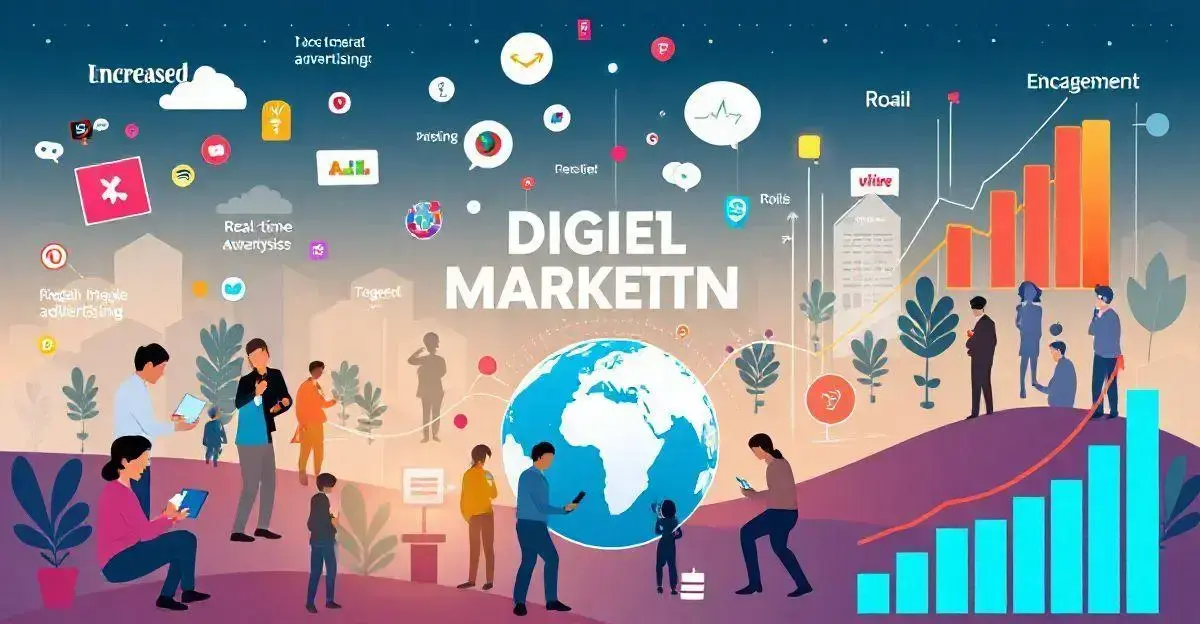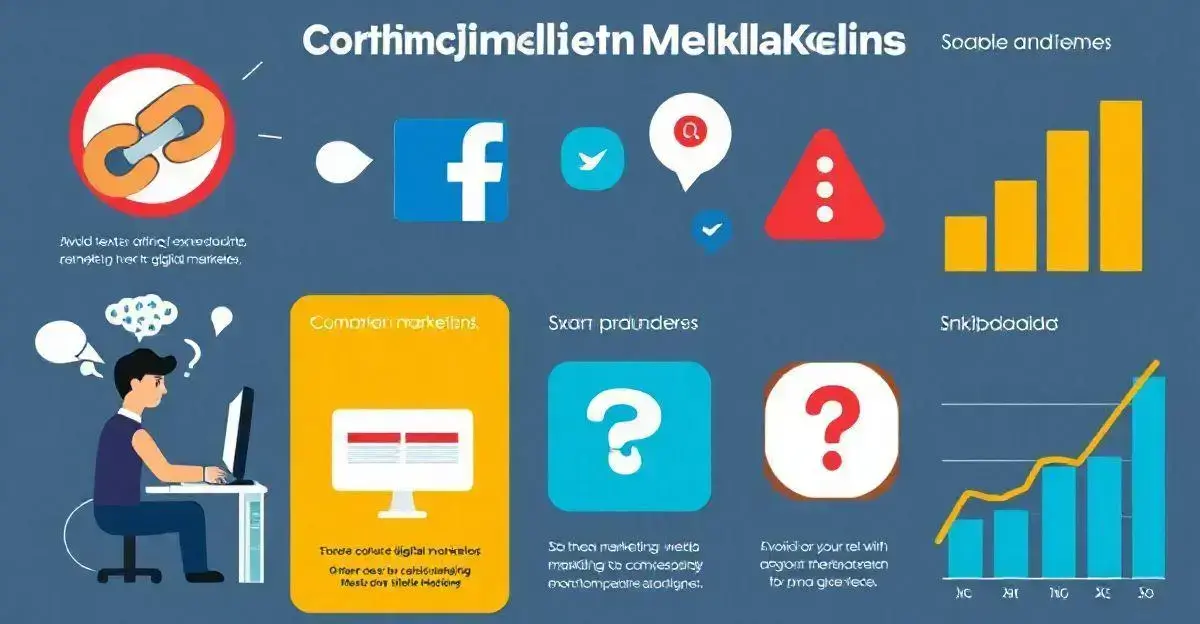Digital marketing is changing the landscape of how businesses engage with customers.
By leveraging online platforms and innovative strategies, companies can enhance their visibility and reach a broader audience.
In today’s fast-paced digital environment, understanding the nuances of digital marketing is not just beneficial but essential for any business aiming to succeed.
Understanding Digital Marketing
Understanding digital marketing is crucial for any business in today’s online world. It encompasses various strategies aimed at reaching potential customers through digital channels. These channels include search engines, social media, email, and websites. By using digital marketing, businesses can target their audience more precisely compared to traditional marketing methods.
Moreover, digital marketing allows for real-time feedback. Businesses can track how their campaigns are performing and make adjustments quickly. This data-driven approach helps in optimising strategies and ensuring better returns on investment.
In addition, being present online enables businesses to engage with customers in meaningful ways. Interactions via social media or email campaigns can build strong relationships and encourage brand loyalty. Overall, understanding digital marketing is not just about using tools; it’s about connecting with your audience effectively in a digital landscape.
Key Benefits of Digital Marketing

Digital marketing offers numerous benefits that can help businesses grow and reach their goals. First, it is often more affordable than traditional marketing methods, allowing companies of all sizes to compete.
With targeted strategies, businesses can reach specific audiences, ensuring that their marketing efforts are effective.
Another key benefit is the ability to measure results in real-time. Tools such as Google Analytics provide insights into what works and what doesn’t, enabling businesses to adjust their campaigns quickly for better outcomes. This data-driven approach is crucial for optimising marketing strategies.
Furthermore, digital marketing enhances customer engagement. By using social media and email marketing, businesses can connect directly with their customers, addressing their needs and preferences. This two-way communication fosters deeper relationships and can lead to increased customer loyalty.
Lastly, the global reach of digital marketing is a major advantage. Brands can expand their presence beyond local borders, tapping into international markets and growing their customer base significantly.
Essential Tools for Digital Marketing Success
To achieve success in digital marketing, it is crucial to use the right tools. Several essential instruments can enhance your marketing efforts. First, social media management tools like Hootsuite or Buffer allow businesses to schedule posts, track engagement, and manage multiple accounts efficiently.
Secondly, SEO tools such as SEMrush and Ahrefs help optimize your website for search engines. These tools provide valuable insights into keywords, backlinks, and competitor analysis, ensuring your content ranks higher.
Email marketing platforms like Mailchimp or Constant Contact play a pivotal role in reaching your audience directly. They allow businesses to create engaging newsletters and campaigns and analyze open rates and click-through rates for better performance.
Moreover, using Google Analytics is vital for tracking website traffic. This tool gives insights into user behaviour, helping businesses understand what attracts their audience and how to improve.
Finally, content creation tools such as Canva or Grammarly assist in producing high-quality content. Canva helps create visually appealing graphics, while Grammarly ensures that your writing is clear and error-free.
By integrating these tools into your digital marketing strategy, you can streamline your processes, enhance your online presence, and achieve better results.
Creating a Digital Marketing Strategy

Creating a digital marketing strategy is essential for any business looking to thrive online. Begin by defining your goals. Are you aiming to increase sales, boost brand awareness, or enhance customer engagement? Clear objectives will guide your strategy.
Next, identify your target audience. Understanding who your customers are helps tailor your messaging and choose the right channels to reach them. Use market research and analytics tools to gather data on their preferences and behaviours.
Once you know your audience, select the right digital channels. Consider options like social media, email marketing, and search engine optimisation. Each platform has unique advantages, so choose ones that align with your goals and audience.
Always create a content calendar to plan and schedule your posts. Consistency is vital in maintaining engagement with your audience. Quality content that provides value to your audience will foster trust and loyalty.
Lastly, monitor and adjust your strategy over time. Use analytics to assess what’s working and what’s not. This data will help you make informed decisions to optimise your digital marketing efforts.
Measuring Digital Marketing Effectiveness
Measuring digital marketing effectiveness is crucial for understanding the success of your strategies. Firstly, identify key performance indicators (KPIs) that align with your goals. These might include website traffic, conversion rates, and social media engagement.
Use tools like Google Analytics to track website performance. This tool provides insights into user behaviour, showing how visitors interact with your site. It can reveal which pages are most popular and where users drop off.
Additionally, conversion tracking is essential. This involves monitoring actions such as purchases, sign-ups, or downloads that users take on your website. Setting up conversion goals will help measure how effectively your marketing leads to desired outcomes.
Social media analytics also plays a vital role. Platforms like Facebook and Instagram offer insights into post engagement, reach, and audience demographics. This data helps you understand what content resonates with your audience.
Lastly, regular reporting is necessary. Collecting data over time allows you to observe trends and make informed adjustments to your strategy. By analysing results regularly, you can optimise your marketing efforts and achieve better results.
Common Mistakes in Digital Marketing

When diving into digital marketing, it is easy to make common mistakes that can hinder progress. One frequent error is not defining clear goals. Without specific aims, it becomes challenging to measure success.
Another mistake is neglecting the importance of understanding your target audience. Failing to research customer preferences can lead to ineffective campaigns that do not resonate with potential clients.
Additionally, many businesses overlook the value of SEO. Ignoring search engine optimisation can result in poor visibility online, meaning that potential customers may never find your brand.
Moreover, inconsistent branding across different channels can confuse customers. It is crucial to maintain a unified message and design that accurately reflects your company’s identity.
Lastly, not analysing performance data is a significant oversight. Regularly reviewing metrics allows for informed adjustments and improvements. By avoiding these common mistakes, businesses can enhance their digital marketing efforts and achieve better results.
Future Trends in Digital Marketing
The future of digital marketing is evolving rapidly, driven by technological advancements and changing consumer behavior. Several key trends are shaping the industry and redefining strategies.
One major trend is the rise of artificial intelligence (AI). AI tools enable businesses to automate and personalize marketing efforts, improving efficiency and effectiveness. By analyzing vast amounts of data, companies can better understand customer needs and preferences.
The growth of video content is another significant development. Platforms like TikTok and Instagram Reels have skyrocketed in popularity, prompting brands to adopt engaging video marketing strategies. Short, captivating videos are highly effective for reaching broader audiences and boosting customer interaction.
Influencer marketing also remains a dominant force. Partnering with influencers helps brands connect with their target audiences through trusted voices, creating authentic campaigns that drive higher engagement.
As data privacy becomes a growing concern, businesses must prioritize transparency and comply with regulations like GDPR. Building trust through responsible data practices is crucial in today’s environment.
Finally, voice search is becoming increasingly common as more users rely on voice assistants. Optimizing content for voice search with natural language and focusing on local SEO can help businesses maintain visibility in this changing landscape.
By embracing these trends, companies can stay ahead in the ever-evolving digital marketing landscape.
FAQ – Frequently Asked Questions about Digital Marketing
What is digital marketing?
Digital marketing refers to the use of online platforms and tools to promote products or services to consumers.
How can social media influence my business?
Social media helps businesses reach a larger audience and engage directly with customers, enhancing brand awareness and loyalty.
What tools can I use for SEO?
Tools like SEMrush, Ahrefs, and Google Keyword Planner are popular for enhancing search engine optimisation efforts.
Why is content important in digital marketing?
Quality content attracts and retains customers, boosts SEO rankings, and positions businesses as leaders in their industry.
How can I measure the effectiveness of my digital marketing?
Utilise analytics tools such as Google Analytics to track key performance indicators and assess the success of your campaigns.
What is the role of email marketing?
Email marketing allows businesses to send targeted messages to customers, fostering engagement and driving sales through personalised content.
